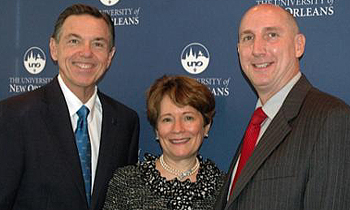Nice Above Fold - Page 499
Lehrer accepts invitation to moderate first presidential debate
Jim Lehrer, executive editor of PBS NewsHour, will moderate the first national presidential debate on Oct. 3, the Commission on Presidential Debates announced today. The 90-minute event from 9 to 10:30 p.m. Eastern will focus on domestic policy. In a statement accepting the invitation, Lehrer said he was particularly interested in the new format: six segments of about 15 minutes each on topics chosen by the moderator and announced several weeks before the event. “I believe an invitation from the Commission on Presidential Debates is similar to a draft notice — a civic responsibility,” Lehrer said. “Even so, it was a difficult decision, because I have previously said I would not do any more debates.Story examines success of psychiatrist Daniel Amen, PBS pledge guru
The Washington Post Magazine has published an in-depth article on Daniel Amen, the psychiatrist whose pledge programs have raised some $40 million for PBS stations. It focuses on Amen’s use of SPECT, or single photon emission computed tomography, a nuclear imaging test measuring blood flow in organs, and the controversy that his claims of success have sparked in the field of psychiatry. In the story, Amen says his latest PBS pledge program, “Use Your Brain to Change Your Age,” has aired 2,300 times on member stations so far this year. Maryland Public Television says 252 presentations have netted about $400,000 in donations; WETA in suburban D.C.Olympic boxing champ featured in PRX special, Kickstarter-funded film
Claressa Shields, the 17-year-old who yesterday slugged her way to the first ever middleweight gold medal in Olympic women’s boxing, participated in two prominent public media projects, one of which recently began airing on public radio stations through Public Radio Exchange (PRX) distribution. Shields, who hails from Flint, Mich., was the principal subject in “Go For It: Life Lessons From Girl Boxers,” a radio special produced by New York’s WNYC. Hosted by actor Rosie Perez and producer Marianne McCune, the radio documentary follows Shields and other women fighters as they train to qualify for the Olympics. Producers are updating the program to include material about her Olympic victory.
New Hampshire PTV, WGBH announce collaboration
New Hampshire Public Television and WGBH in Boston announced today a collaboration in both programming and back-office tasks. The two said in a statement that each will remain independently owned and operated stations. They have posted a website to explain the upcoming changes to viewers in both states. NHPTV will contract for services in broadcast technologies, membership services and financial administration, which will allow for financial savings that may be redirected to programming, the announcement said. “The collaboration will provide operational economies, which are key to NHPTV’s continued success following the loss of its state funding and its transition from an entity of the University System of New Hampshire to an independent, community-licensed public media organization,” it said.WGBH taps into Olympic spirit with new online doc project
An online-only documentary project from WGBH is channeling the Olympic spirit toward a major sporting event that receives scant media coverage yet is of great interest to under-served audiences.WGBH widens radio reach with PRI acquisition
WGBH’s acquisition of Public Radio International, announced July 26, positions the station and network to step up their longtime collaboration as co-producers.. PRI will remain operationally independent ... and be responsible for raising its own revenue...
NPR receives $1.5 million grant to support race and ethnicity reporting
...Like Planet Money, the as-yet-unnamed unit will establish its brand on multiple platforms, through reports for NPR’s radio shows, a blog and other facets...Pacifica budget cuts delayed
Leaders of the Pacifica Foundation will seek a new executive director and are asking stations for financial information before ordering across-the-board cuts pushed by current Executive Director Arlene Engelhardt.Detroit PTV to lead nationwide dialogue on Arab-Americans, funded by Kellogg Foundation
Detroit Public TV has received a $250,000 grant from the W.K. Kellogg Foundation for a national program increasing public understanding of the Arab-American community. The project builds on the station’s 13-part series, Arab-American Stories. For the initiative, “Arab-American Stories — A National Dialogue,” Detroit PTV will partner with PBS member stations, libraries and community centers to host forums. The station worked with the Arab American Institute in Washington, D.C., to identify library systems in the top Arab-American populated communities nationwide, which include Boston, Houston, Los Angeles and Miami. The station also plans a website and curriculum for middle- and high-school students.If ratings don’t correlate to dollars at pledge time, what will?
PBS began mining national Nielsen data for pledge-drive audience insights in 2009, but it hasn't learned what to do about declining pledge ratings.University regents call time-out on KUT signal expansion
One of public radio’s biggest split-format stations, Austin’s KUT, is pursuing a signal expansion that follows a familiar playbook for strengthening audience service: buying a new channel to air music while dedicating its flagship signal to news programming. But for this station serving a city that makes weirdness a point of civic pride, there’s a distinct difference to its ambitions to become a dual-station operator. It will put rock and alternative music, not classical, on its new signal; 90.7 MHz, the FM channel that has served KUT’s news and music audiences for decades, will go all-news. That’s if and when the University of Texas Board of Regents, the governing board of KUT’s licensee, approves the proposed $6 million purchase of 98.9 MHz, a commercial frequency that’s now broadcasting classic rock hits under the call letters KXBT.Aronson promoted at Frontline, NPR Board elections, Lapin joins Current, and more...
The promotion, announced during the Television Critics Association Press Tour last month, was widely reported as an indication that Aronson will succeed founding Executive Producer David Fanning atop PBS’s investigative news centerpiece.WWNO, NPR plan expanded newsroom to serve New Orleans
A group of public radio partners is preparing to launch a new local journalism nonprofit that will employ upwards of 20 people in a hybrid digital/broadcast newsroom.Thicket of uncertainty for federal aid
Public broadcasters face multiple and serious uncertainties on Capitol Hill over the next few months. A spending bill approved by the House subcommittee with oversight of CPB’s appropriation proposes to phase out CPB funding over the next three years; it includes language restricting public radio stations from spending their CPB aid to support NPR in any way. Another election-season threat comes from GOP presidential hopeful Mitt Romney, who has repeatedly cited CPB as one of five agencies he’d extinguish. Sequestration, a byproduct of Congress’s inability to reach consensus on debt-reduction measures last summer, could also hit pubcasting, slicing 8 percent or more from the $445 million in federal funding that pubcasters anticipate for 2013.Daisey, onstage and off air, revives his 'Agony and Ecstasy'
“There is no objective, journalistic version of the show,” Daisey said. “I will be, always, making constant lies of omission by leaving out tons and tons and reams and reams of details."
Featured Jobs








